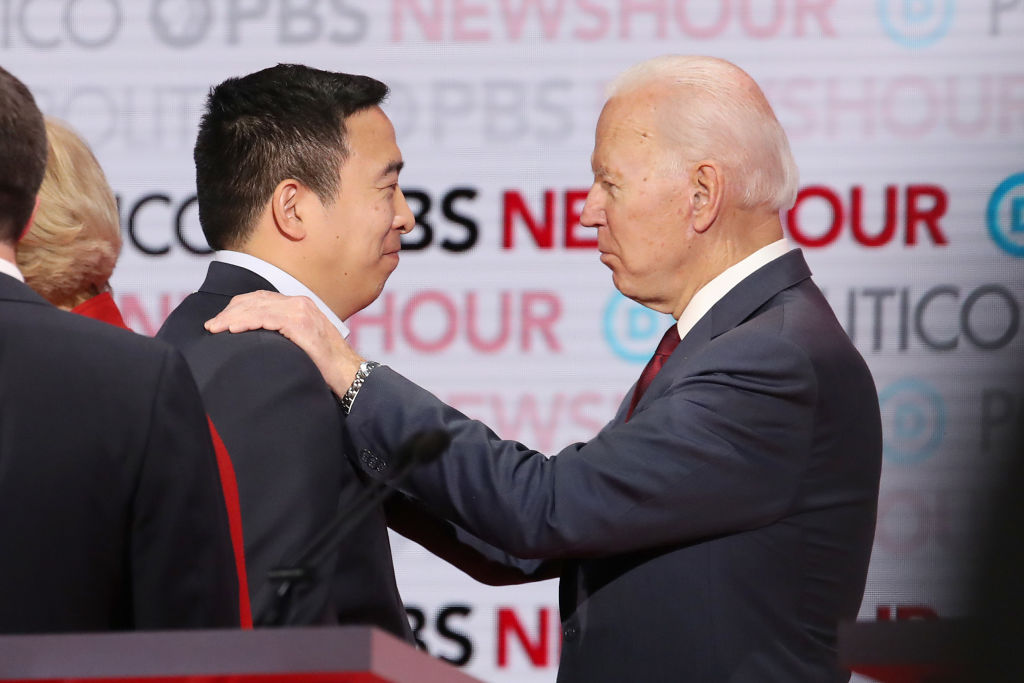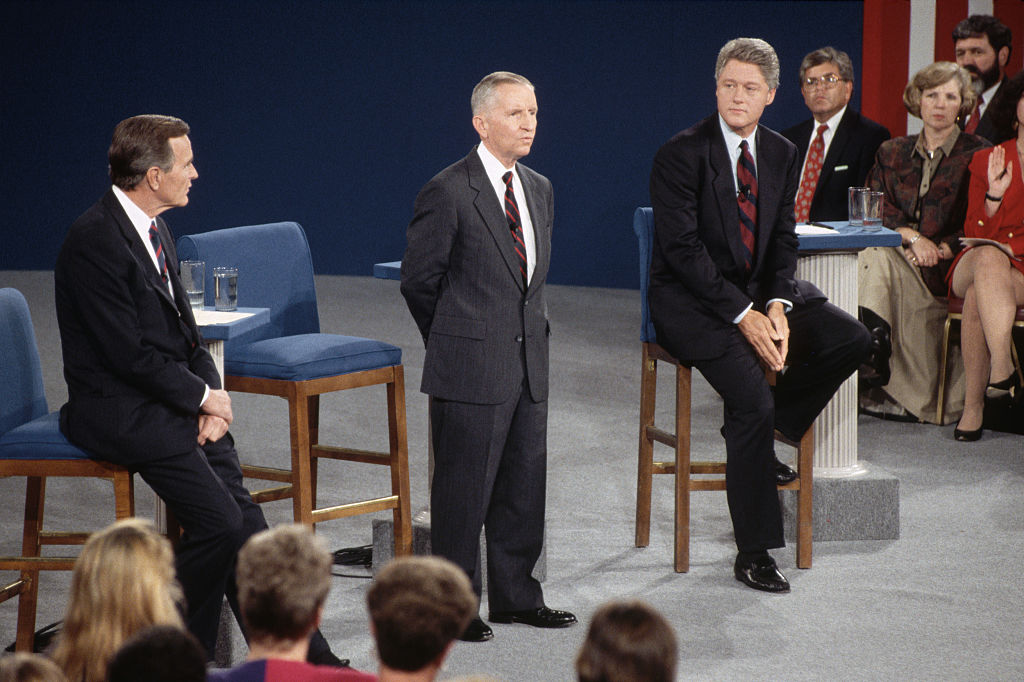
LOS ANGELES, CALIFORNIA – DECEMBER 19: Democratic presidential candidate Andrew Yang (L) speaks with former Vice President Joe Biden during the Democratic presidential primary debate at Loyola Marymount University on December 19, 2019 in Los Angeles, California. Seven candidates out of the crowded field qualified for the 6th and last Democratic presidential primary debate of 2019 hosted by PBS NewsHour and Politico. (Photo by Justin Sullivan/Getty Images)
Andrew Yang has formed a new third party to disrupt the current Democrat vs. Republican system – but will it work? The former Democratic presidential hopeful founded the Forward Party in 2021, which backed a whopping seven candidates in the 2022 primaries, none of whom will now appear on the ballot in November. Now Yang is joined by former-Rep. David Jolly (R-FL) and Christine Todd Whitman, a former Republican governor of New Jersey. The three are combining their organizations into a new political supergroup, called – wait for it – Forward. Is Yang eying the White House again? Well, he hasn’t ruled it out, especially if 2024 shapes up to be another Trump-Biden contest. Candidates who run outside the establishment earn a reputation as being disruptors – and Yang, so far, embraces the label – but do these outsiders ever really deserve the credit they get?
The party says its purpose is to “reinvigorate a fair, flourishing economy” and to “give Americans more choices in elections, more confidence in a government that works, and more say in our future.” Already, political watchers are casting aspersions at the new party, declaring it a danger to Democrat electoral hopes, but with Yang pulling support from both sides of the aisle, he feels Forward walks a more central path.
The Dreaded Third Party
If Forward manages to gain attention and votes, how could this new third party affect the 2024 election? An answer may be found by looking to previous races in which outsiders upset the apple cart.
The big year for third parties in the last couple of decades was 2016, when Gary Johnson and Bill Weld took 3.3% of the national vote. And yes, that tiny number is impressive, as it was the best the Libertarian Party ever achieved, as well as the closest anyone has come to breaking up the two-party power plan since Ross Perot. Johnson ran for president as a Libertarian back in 2012, too, but he didn’t come anywhere near making a difference in even the closest states. Ralph Nader failed to impress as an Independent in 2004 or 2008, and no other alternative candidate broke 1% in any state other than 2008 Libertarian Bob Barr’s 1.06% in Indiana.
Generally, when people complain about extra candidates throwing the election – especially amongst Republicans – Ross Perot is the name they curse. It’s the election of ’92 that earns the Texas businessman his prominence in history. Bill Clinton beat George H.W. Bush in 32 states and the District of Columbia, taking 370 electoral votes to become president. That doesn’t sound like a close election – but it was. Ross Perot hammered Clinton’s margin over Bush in 32 of those states – by double-digits in 20. He even took more votes than Bush himself in two of the three Maine districts and came close in several other states. Given his performance, one could be forgiven for suspecting the short-tempered Texan could have become president if only Clinton hadn’t known so well how to push his buttons during the debates.

(Photo by © Wally McNamee/CORBIS/Corbis via Getty Images)
But wait; there’s more. As impressive as 1992 was, it was nothing compared to 1912. Theodore Roosevelt split from the GOP and pulled a higher percentage of the vote than his Republican opponent, William H. Taft, in a whopping 29 states. Though Roosevelt was not to win the election, his campaign was relatively successful and he placed second, after Democrat Woodrow Wilson. The final breakdown was 41.84% of the popular vote and 435 electors from 40 states for Woodrow Wilson, 27.4% of the popular vote and 88 electors from six states for Roosevelt, and 23.17% of the popular vote with just eight electors from two states for Taft.
So, can candidates from a third party throw a wrench in the gears for establishment picks otherwise destined for glory? According to Teddy Roosevelt and Ross Perot – and maybe Ralph Nader – you bet they can. Does that mean President Joe Biden ought to tremble as the Yang gang prepares for 2024? All signs point to yes. In fact, if our current commander-in-chief does indeed run again in 2024, a split Democrat vote might be a blessing in disguise; it’ll give him something to blame his problems on other than his own incompetence.
Remember to check out the web’s best conservative news aggregator
Whatfinger.com — the #1 Alternative to the Drudge


